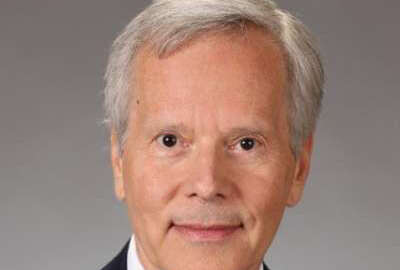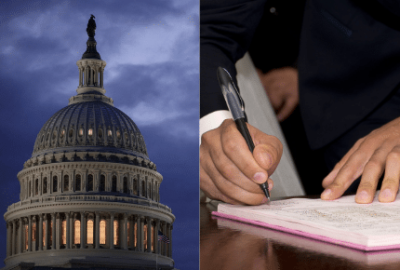To listen to the Federal Newscast on your phone or mobile device, subscribe in PodcastOne or Apple Podcasts. The best listening experience on desktop can be found using Chrome, Firefox or Safari.
- The Office of Personnel Management wants to change how and when federal employees might receive back pay for an unjustified or unwarranted personnel action. OPM issued new draft regulations that reinterpret the agency’s own 40-year-old interpretation of the Back Pay Act. OPM said the Back Pay Act only covers personnel actions like a firing or suspension, not disputes over retirement, overtime or a performance award. The proposed rule would also exclude federal unions from receiving attorneys fees for representing their members who prevail in personnel cases.
- Lawmakers look at long-term telework to bring more people with disabilities into the federal workforce. Former Sen. Tom Harkin (D-Iowa), author of the Americans with Disabilities Act, said the coronavirus pandemic has shown that individuals with limited mobility can take on federal work remotely. Bipartisan Disability Caucus Co-Chair Jim Langevin (D-R.I.) agreed, and said mandatory telework has created opportunities for people with disabilities. The federal government exceeded disability hiring goals under the Obama administration, but 60% of those hires only stayed in government for less than two years. (Federal News Network)
- The IRS is turning to automation to reduce the amount of low-value or manual work its employees do. The IRS launched two initiatives using robotics process automation and have two more in the planning stages that will save thousands of hours worth of work for contracting officers. The first one in production uses software to review contract clauses. The second one uses automation to verify vendor trustworthiness. The bot auto populates a form in seconds instead of it taking two to three hours of manual work for the employee. Two other bots in the works that will focus on the complying with the DATA Act and collecting data on wage and salary determinations.
- The latest allegations of violating the Hatch Act has one advocacy group calling for the removal of White House trade policy advisor Peter Navarro. The group Citizens for Responsibility and Ethics in Washington said Navarro has violated the act in several recent interviews where he has made politically charged statements supporting the president’s reelection campaign.
- Several employees at the Environmental Protection Agency said they have no confidence in their leadership. Nearly 700 EPA employees issued a vote of no confidence in the agency’s ability to keep them safe during the ongoing pandemic. The EPA employees who voiced their concerns are part of the American Federation of Government Employees and the National Treasury Employees Union. They say the agency is moving ahead with reopening too quickly. They’re calling on the EPA to allow employees to continue telework until there’s a viable COVID-19 vaccine.
- The Postal Service saw a sharp decline in mail volume with the rise of email, but a generation born in the digital era still gives the agency high marks. A USPS inspector general survey found 80% of Generation Z respondents had a positive impression of the Postal Service, and said they send and receive cards and letters at least several times a year. Pew Research Center survey results rated the Postal Service as the most popular federal agency among the public.
- Small businesses should be on the look out for a request for information later this month from the General Services Administration on its new governmentwide acquisition contract. Called Polaris, GSA said the RFI will help it further create the strategy for the next generation small business multiple award IT services contract. Part of that acquisition approach will include improved proposal submission and evaluation processes, including using objective criteria and possibly a self-scoring system. GSA expected to issue a draft solicitation in the next few months.
- Defense Secretary Mark Esper released his plan to update the Navy’s fleet in the next 25 years. Esper revealed his Battle Force 2045 plan during an event held by the Center for Strategic and Budgetary Assessments. The plan calls for achieving a fleet of 500 manned and unmanned ships by 2045, and a fleet of 355 traditional battle force ships by 2035. The plan would also look to create a greater presence for nuclear powered aircraft carriers.
- The Defense Department wants a very different kind of service member in 2030. Technological savvy, digital literacy and working hand in hand with virtual systems — that’s the kind of person the military wants to recruit and retain for the service 10 years into the future. In its new personnel strategy, the Pentagon is thinking about how it will contend with near-peer competitors like China and Russia. DoD thinks in order to recruit these highly talented people it needs to better its workforce management practices. The military is rethinking how it will place people into positions based on their skill, preference and knowledge. (Federal News Network)
- The Pentagon’s personnel office releases a new ten-year strategy for attracting and managing the DoD workforce. The Personnel and Readiness strategy echoes some of the themes the military services have embraced in recent years, including the need to move the military from “industrial age” processes to modern talent management practices. The strategy also called on the Pentagon to become more data-driven with its personnel policies, and deliver more relevant education and training materials to its military and civilian workforce.
- The Space Force and Air Force received 166 applications to their first ever Space Test Fundamentals Course. The class is a 13-week, hands-on program designed to train personal in the basics of space domain test and evaluations. Students will be taught subjects like orbital mechanics and satellite bus design. The course will help the Space Force build a workforce of testing and engineering professionals to meet its demands. It is open to all military officers, enlisted and civilian personnel.
Copyright
© 2025 Federal News Network. All rights reserved. This website is not intended for users located within the European Economic Area.




